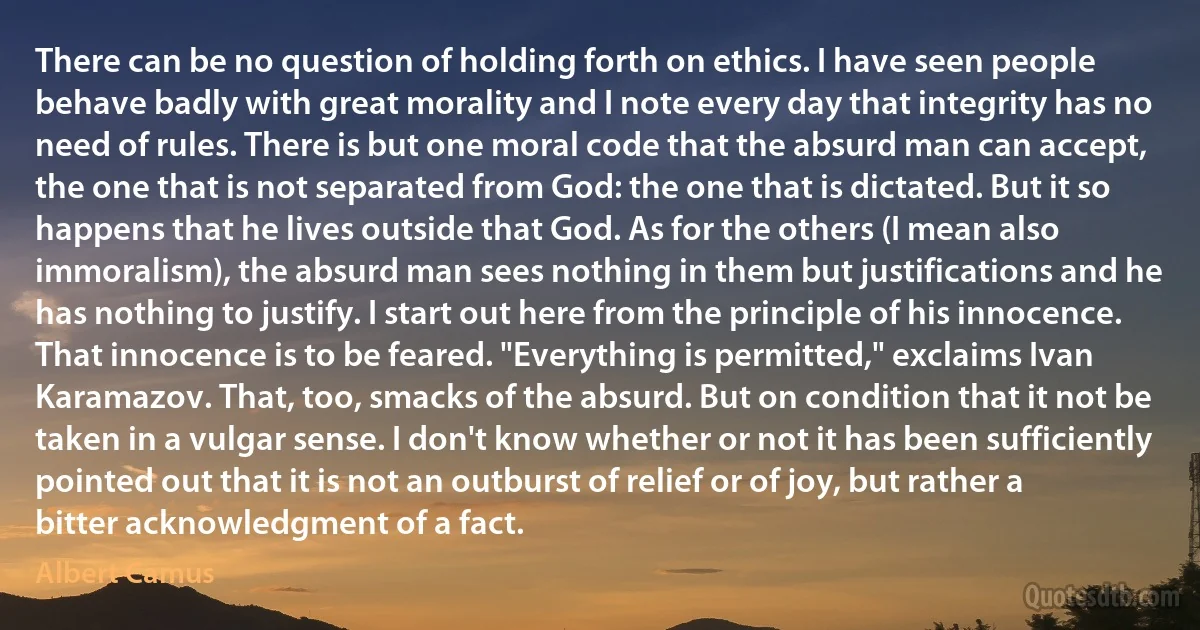
There can be no question of holding forth on ethics. I have seen people behave badly with great morality and I note every day that integrity has no need of rules. There is but one moral code that the absurd man can accept, the one that is not separated from God: the one that is dictated. But it so happens that he lives outside that God. As for the others (I mean also immoralism), the absurd man sees nothing in them but justifications and he has nothing to justify. I start out here from the principle of his innocence. That innocence is to be feared. "Everything is permitted," exclaims Ivan Karamazov. That, too, smacks of the absurd. But on condition that it not be taken in a vulgar sense. I don't know whether or not it has been sufficiently pointed out that it is not an outburst of relief or of joy, but rather a bitter acknowledgment of a fact.
Albert CamusRelated topics
acknowledgment bitter code condition day ethics everything forth great holding joy lives man mean need note nothing outburst outside people question seen sense start take others ivan RulesRelated quotes
For what advantage is it, that the world enjoys profound peace, if thou art at war with thyself? This then is the peace we should keep. If we have it, nothing from without will be able to harm us. And to this end the public peace contributes no little: whence it is said, ‘That we may lead a quiet and peaceable life.' But if any one is disturbed when there is quiet, he is a miserable creature. Seest thou that He speaks of this peace which I call the third (inner, ed.) kind? Therefore when he has said, ‘that we may lead a quiet and peaceable life,' he does not stop there, but adds ‘in all godliness and honesty.' But we cannot live in godliness and honesty, unless that peace be established. For when curious reasonings disturb our faith, what peace is there? or when spirits of uncleanness, what peace is there?

John Chrysostom
It is said the South will never submit - that we cannot conquer the rebels - that they will suffer themselves to be slaughtered, and their whole country to be laid waste. Sir, war is a grievous thing at best, and civil war more than any other; but if they hold this language, and the means which they have suggested must be resorted to; if their whole country must be laid waste and made a desert, in order to save this Union from destruction, so let it be. I would rather, Sir, reduce them to a condition where their whole country is to be re-peopled by a band of freemen, than to see them perpetrate the destruction of this people through our agency. I do not say it is time to resort to such means, and I do not say that the time will come, but I never fear to express my sentiments. It is not a question with me of policy, but a question of principle.

Thaddeus Stevens
This Prime Minister must be drummed from office and we will use each and every opportunity to make that a reality...But this Prime Minister deserves to be impeached - and we, with others, will present the case that he should be required to answer...I believe that this Prime Minister now operates outside the currency of debate, beyond the pale of decency...I don't just challenge the policies of Tony Blair, I challenge his morality...This is not a question of this Prime Minister - any prime minister - making a judgement call and just being wrong. It is not a matter, as Blair would have us believe, of someone acting in good faith and making an honest mistake. This is a man who buried the intelligence that was inconvenient, manipulated the information to suit his purpose, and entered into a secret pact with the American President to go to war come what may.

Alex Salmond
Let a man get once fairly possessed of any peculiar notion, whether it be on religion, political economy, morals, politics, arts, or anything else, and he sees little beside his beloved principle, which he is at all times ready to advance, defend, demonstrate, or expatiate on. Nothing can be simpler than the two great dogmas of Christianity, which are so plain that all can both comprehend them and feel their truth. They teach us to love God, the surest way to obey him, and to love our neighbor as ourselves. Any one can understand this; all can see how just it is, and how much of moral sublimity it contains. It is Godlike, and brings us near the very essence of the Divinity, which is love, mercy, and truth. Yet how few are content to accept the teachings of the Saviour in this respect, without embarrassing them with theories that have so much of their origin in human fancies.

James Fenimore Cooper
Can anyone with intelligence really believe that a child born today should be doomed because the snake tempted Eve and Eve tempted Adam? To believe that is not God-worship; it is devil-worship.
Can anyone call this scheme of creation and damnation moral? It defies every principle of morality, as man conceives morality. Can anyone believe today that the whole world was destroyed by flood, save only Noah and his family and a male and female of each species of animal that entered the Ark? There are almost a million species of insects alone. How did Noah match these up and make sure of getting male and female to reproduce life in the world after the flood had spent its force? And why should all the lower animals have been destroyed? Were they included in the sinning of man? This is a story which could not beguile a fairly bright child of five years of age today.

Clarence Darrow
